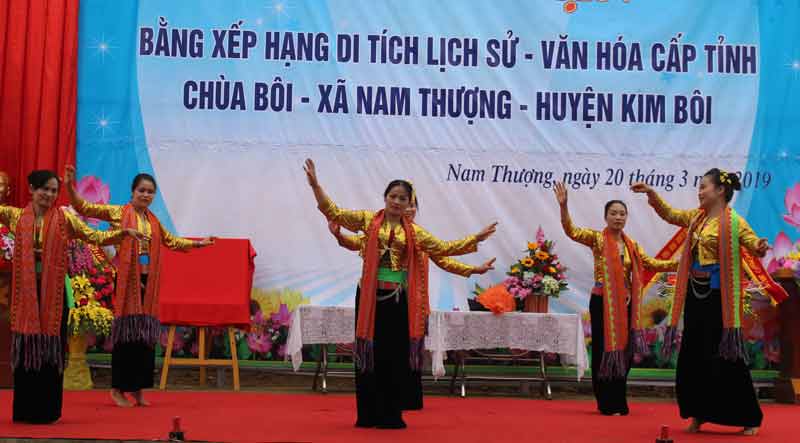
(HBO) - In recent years, the mass art movement in Nam Thuong commune (Kim Boi) has been widely growing, attracting a great number of people to join the performance teams of every village and hamlet. Thereby, it has been contributing to the preservation and development of the advanced culture imbued with the national cultural identity and it has also met the demand for people's cultural and artistic enjoyment.
 The performance team of Bo Ca hamlet is
performing at the ceremony to receive the certificate of the Cultural Heritage
at the provincial level in Chua Boi province, Nam Thuong commune (Kim Boi).
The performance team of Bo Ca hamlet is
performing at the ceremony to receive the certificate of the Cultural Heritage
at the provincial level in Chua Boi province, Nam Thuong commune (Kim Boi).
Being at the ceremony to receive the
certificate of the Cultural Heritage at the provincial level of Boi Pagoda in
Nam Thuong commune, we were enjoying many excellent art performances imbued
with the national cultural identity acted by the performance team of Bo Ca
village. Dressed in traditional costumes, the actors and artists of the
performance team of Bo Ca village have attracted people to the lyrics and
dances with a simple, rustic performance.
Ms. Bui Thi Xuan Loc, the cultural officer
of Nam Thuong commune says that the Party Committee and the appropriate
authorities of the commune have always paid attention to and created all
conditions for the movement of culture, sports and physical activities to
develop in recent years. From the
investment budget of the national target program on the new rural construction,
the commune has focused on directing and promoting the socialization,
mobilizing people to contribute to building basic cultural institutions,
creating a foundation to develop mass art movement, meeting the people's demand
for the cultural creation and enjoyment.
Currently, 100% of the villages have their own
performance team with from 20 to 30 members who have the passion and love of
traditional singing, dancing and musical instruments. Particularly, due to the
large and densely populated area, the performance team of Bo Ca hamlet has over
40 participants and it is divided into 4 small groups to practice. The
performance teams operate under the method of socialization. They voluntarily
donate money to purchase equipment and performance costumes to serve the local
political tasks and the demand to enjoy the culture and art of the local
people.
The activities of the performance teams are
regularly maintained at the cultural houses of every village and hamlet and
they are integrated into the regular meetings of the associations and the
unions. Each performance team has its own strengths and most of the art
performances of the teams are traditional songs and dances. Typically, they are
the performance teams of Binh Tan village, Doi 3 village, Boi Ca village and so
on. Especially, during the festivals, the competitions and cultural shows
organized by the district, the commune has alternately appointed each team of
the villages, creating conditions for the performance teams to have
opportunities to exchange, learn experiences and improve performance quality.
With an increasingly vibrant and widespread emulation movement aimed at building cultured residential areas and cultured families, Yen Thuy District has been making steady progress toward improving both the material and spiritual well-being of its people, while fostering a civilized, prosperous, beautiful, and progressive community.
Once lacking recreational spaces and community facilities, Residential Group 2 in Quynh Lam Ward (Hoa Binh City) has recently received attention for the construction of a new, spacious, and fully equipped cultural house. The project followed the model of state support combined with public contributions in both labor and funding.
The "All people unite to build cultural life" movement, which has been effectively integrated with Kim Boi district’s socio-economic development goals, is fostering a lively spirit of emulation across local residential areas, hamlets, villages, public agencies, and enterprises. In addition, through the initiative, traditional cultural values are being preserved and promoted, while community solidarity and mutual support in poverty reduction and economic development are being strengthened.
A working delegation of the Hoa Binh provincial People’s Committee led by its Permanent Vice Chairman Nguyen Van Toan on June 11 inspected the progress of a project to build the Mo Muong Cultural Heritage Conservation Space linked to tourism services in Hop Phong commune, Cao Phong district.
Born and growing in the heroic land of Muong Dong, Dinh Thi Kieu Dung, a resident in Bo town of Kim Boi district, in her childhood was nurtured by the sweet lullabies of her grandmother and mother. These melodies deeply imprinted on her soul, becoming an inseparable part of her love for her ethnic group's culture. For over 20 years, this love for her hometown has driven Dung to research, collect, and pass down the cultural values of the Muong people to future generations.
In the final days of May, the Ethnic Art Troupe of Hoa Binh Province organized performances to serve the people in remote, mountainous, and particularly disadvantaged areas within the province. These were not just ordinary artistic shows, but they were the meaningful journeys aimed at spreading cultural values, enhancing the spiritual life of the people and contributing to the preservation of ethnic minority cultural identities.



 The performance team of Bo Ca hamlet is
performing at the ceremony to receive the certificate of the Cultural Heritage
at the provincial level in Chua Boi province, Nam Thuong commune (Kim Boi).
The performance team of Bo Ca hamlet is
performing at the ceremony to receive the certificate of the Cultural Heritage
at the provincial level in Chua Boi province, Nam Thuong commune (Kim Boi).